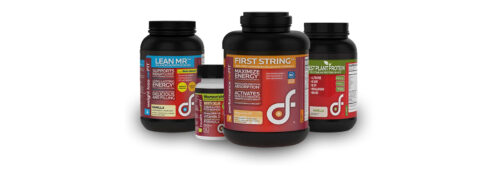
The Secret to a Healthy Diet Plan
It’s Not What You Think
A 2020 study in Ipsos found that 45 percent of individuals globally are actively on a diet. With many fad diets on the market, it’s essential to determine which principles apply to your life and won’t increase your stress levels, as this can cause havoc on your overall mindset and well-being. The truth is that there is no one-size-fits-all approach to healthy eating. An individual approach is essential as it factors in your age, body composition, fitness level, goals, and overall happiness.
Interested in the secret to a healthy diet? It’s not what you think.

There is No One-Size-Fits-All Approach
Dieting is a complex process involving conscious decisions about what to eat and when. There is no one-size-fits-all approach to dieting that works for everyone. For some the Mediterranean diet works well. For others it is a low-fat diet free from processed foods. It may even be as simple as focusing on nutrient-dense foods. The key is to understand that everyone’s body is different, and so are their metabolisms and dietary preferences. What works for one person may not work for another.
“There are many diet plans on the market today that promote good health,” shares Emily Kyle, RDN. “The key is finding one that does not cause you stress or agony.” Ask yourself questions such as: Would the diet guidelines make you happy? Anxious? Stressed? Are you able to follow them long-term? “You should strongly consider factors such as enjoyment, flexibility, and longevity.”
It is important to remember that diets should be tailored to each individual’s needs and goals. A person’s height, weight, daily activity level, and unique dietary preferences must be considered when deciding to adopt new eating habits. Individuals should also consider their health conditions, any chronic diseases, and specific lifestyle factors when deciding on a diet.
The most critical aspect of any healthy eating plan is to ensure that it provides a balanced, nutritious diet that meets the individual’s specific needs. A healthy diet should include a variety of foods from all the food groups, including fruits and vegetables, whole grains, low-fat dairy, lean proteins, and healthy fats.
It’s All About You
A healthy diet is all about you and how you choose to fuel your body. Eating healthy doesn’t mean you must adopt a vegetarian diet, low-carb diet, keto diet, Ornish diet, volumetrics diet, nordic diet, and the list goes on. It doesn’t mean you must consume large amounts of fresh fruit, whole grains, healthy fats, olive oil, whole and intact grains, and antioxidant-rich foods. And it doesn’t mean you must deprive yourself of the foods you love. Instead, it means you must be mindful of what you eat and aim for nutritious foods that fuel your body and ensure it provides your body with the vitamins and minerals it needs to thrive.
Eating various foods from all the food groups, including fruits and vegetables, whole grains, lean proteins, and healthy fats, such as olive oil, will ensure you get the essential vitamins and minerals your body needs. Drinking plenty of water and limiting processed foods and added sugars can help you maintain a healthy diet. Eating for health can be an enjoyable and rewarding experience, so focus on nourishing your body with real, nutritious food, and you’ll be on your way to a healthier and happier you.

The Primary Areas to Consider
When adopting an eating plan, it is essential to consider the five primary areas of any individual diet. This includes sugar, calories, carbohydrates, unhealthy fats, and, for some, alcohol. Each of these areas has unique nutritional needs and should be considered carefully when making healthier dietary choices.
Sugar
Sugar is one of the most essential areas to consider when trying to adopt a healthy diet. Sugar is a source of empty calories and can cause rapid spikes in blood sugar levels. Examples of foods dense in sugar are sodas, candies, cakes, processed foods, pasties, and syrups. It is essential to note, however, that there is a difference between natural and artificial sugars and sweeteners.
Glucose and fructose are natural sugars commonly found in fruits and vegetables. Artificial sweeteners are chemically modified sugars in a lab and provide sweetening typically without calories. Natural sweeteners don’t include added chemical products that interfere with biological or physiological processes, unlike artificial sweeteners.
Too much sugar in an individual’s diet can lead to significant weight gain, diabetes, and additional health complications. When deciding to consume sugar, again, it is best to opt for natural sources like fruits and vegetables versus processed sugars, such as those found in candy and soda. These should be extremely limited or avoided altogether.
Calories
Calorie intake is another critical area to consider when adopting an eating plan. Calories are the measure of energy stored in the food we eat. To maintain a healthy weight, it is important to consume the right amount of calories for our individual being each day. This varies individual to individual as metabolic rates, our rate at which we burn calories at rest varies based on genetics, muscle mass, and other contributing factors. Consuming too many calories can lead to weight gain, high blood pressure, heart disease, and more.
On the other hand, consuming too few calories can lead to nutrient deficiencies, chronic health issues, and more. A balanced diet with healthy foods, such as a variety of fruits, vegetables, whole grains, and meat or plant-based proteins is essential for sustaining a healthy weight, operating at an optimal level, and feeling our absolute best.
Carbohydrates
Carbohydrates are another vital area to consider when adopting a healthy diet. Carbohydrates are the body’s main energy source and are found in various foods such as grains, fruits, vegetables, and dairy. It is important to choose whole grains and limit refined grains, such as white bread and pasta when consuming carbohydrates. Whole grains provide more fiber, vitamins, and minerals than refined grains and can help keep blood sugar levels stable throughout the day.
Unhealthy Fats
Unhealthy fats are also an important area to consider when trying to adopt an eating plan. Unhealthy fats, such as trans fats and saturated fats, can raise cholesterol levels and increase the risk of heart disease, stroke, high blood pressure, and other medical challenges. It is essential to limit the number of unhealthy fats in the diet and opt for healthier fats, such as unsaturated fats, from sources like nuts, seeds, and avocados.
Alcohol
Alcohol is the last area to consider when trying to adopt a diet consisting of healthy foods. Alcohol is high in calories, has virtually no health benefits, and can contain a variety of other substances, such as sugar and unhealthy fats. Too much alcohol can increase the risk of health problems, such as heart disease, make weight loss extremely challenging, and should be consumed in moderation.

Consider Speaking to a Nutrition Coach
When it comes to adopting a healthy diet, it is always a good idea to consider speaking to a nutrition coach. A nutrition coach is someone who is trained in helping clients live a healthy lifestyle and has a wealth of knowledge about how to eat healthily and how to create an eating plan that will work for you. They can provide you with valuable advice and support that can help you reach your health and wellness goals, from advice on your physical activity to weight management, intermittent fasting, calorie intake, and more.
Nutrition coaches are great for helping you to make the right dietary choices. They can help you to understand what foods you should be eating, how much of each food you should be eating, and how to create a balanced diet plan that is tailored to your individual needs. They can also provide you with education on nutrition so that you can make better-informed decisions regarding your diet.
Nutrition coaches can also provide you with valuable guidance and support to help you make lifestyle changes that can help you reach your health and wellness goals. They can provide advice on how to incorporate physical activity into your daily routine, in addition to motivation and encouragement when you need it. In short, they’re your accountability partner and ultimate supporter.
Calculate Your Baseline
Calculating your baseline before adopting a new healthy diet is essential to be able to determine your progress over time. A baseline measures your current state of health, such as your blood pressure, and can help you track your progress as you work toward your goals.
The first step in calculating your baseline is to assess your current dietary habits. Keep a food diary for at least a week, tracking everything you eat and drink, including sodium intake, lean proteins, fried foods, trans fats, healthy carbs, fresh fruits, whole grains, lean meats, and more. Note what types of foods and drinks you consume, how much of each, and how often. Also, keep track of your portion sizes and nutritional values, if possible.
Next, it can be beneficial to calculate your body mass index (BMI). An article in Medical News Today shares this: “Everybody is different, and various factors play a role in determining each person’s ideal weight. These factors can be biological, such as age, height, and natal sex, but mental factors can be just as important. Individuals may define their ideal weight as the one they feel most comfortable with.”
That said, BMI is a standard tool that measures a person’s weight in relation to their height. This is a measure of your body fat percentage and is calculated by dividing your weight in kilograms by your height in meters squared. A healthy BMI is typically considered to be between 18.5 and 24.9.
In addition to your BMI, you can also choose to measure your waist circumference. This is simply the distance around your waist and should be measured at the smallest point of your waist. A healthy waist circumference is typically considered to be less than 35 inches for women and less than 40 inches for men. Once you have your baseline measurements, you can begin to set goals for yourself. If your BMI is above 25, you may want to work towards a healthier weight. If your waist circumference is too large, you may want to focus on reducing your body fat percentage.
Finally, consider how a nutrition coach can help. A nutrition coach can provide personalized advice and support to help you reach your goals. They can help you create a healthy diet tailored to your lifestyle and provide support and accountability. They can also help you track your progress and make adjustments as needed.
Elevate Your Mindset
When it comes to adopting a new healthy diet, it can be difficult to stay motivated. Fortunately, there are several ways to elevate your mindset and make the process more enjoyable.
Start by setting realistic goals. Set small, achievable goals that you can measure and track. This can help you stay motivated and focused on your diet plan. Additionally, create a plan of action. Write down what meals and snacks you will have each day and at what times. This will help you stay on track and make it easier to stick to your plan.
Another way to elevate your mindset is to focus on the positive changes you are making. Write down all the benefits of your new diet plan and remind yourself of them each day. This can help you stay focused on the positives rather than the negatives. Additionally, make sure to give yourself some flexibility. Allow yourself to indulge in a treat or two each week. This will help you stick to your diet plan in the long run and give you something to look forward to.
Finally, don’t be too hard on yourself. If you slip up, don’t beat yourself up. Everyone makes mistakes, especially when adopting new healthy habits, and that’s okay. The key is to pick yourself up and get back on track as soon as possible. The truth is that there is no one-size-fits-all healthy diet plan. An individual approach is essential as it factors in your age, body composition, fitness level, goals, and overall happiness.
Crunch promotes a culture of positivity, inclusivity, and fun with no judgments by providing an environment for all individuals regardless of their health and fitness goals. Find a Crunch gym near you to try our free trial membership, or join Crunch now. We’re here for you – at the gym or at home. Access the best live & on-demand workouts anytime, anywhere with Crunch+. Ready to get sweaty? Try hundreds of workouts for free! Start your free trial now!














































































